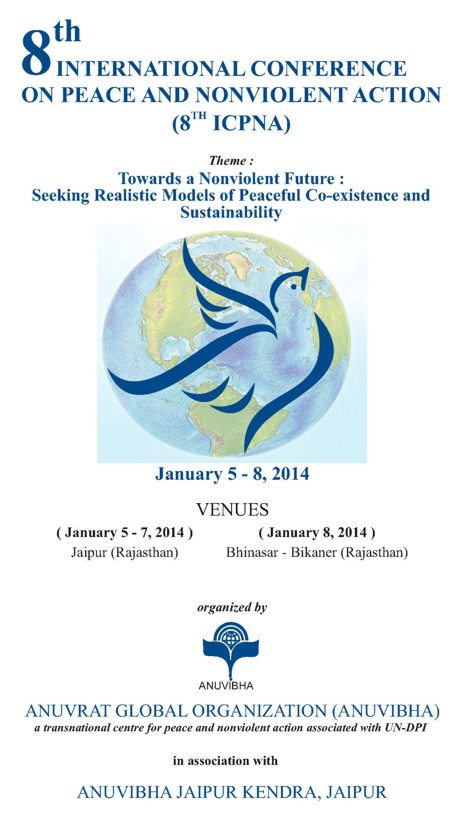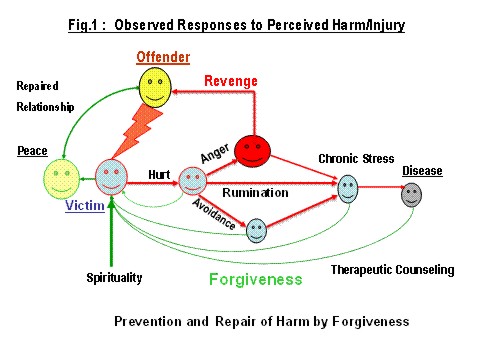 | 8th International Conference on Peace and Nonviolent Action |
Session I: January 5: 18.15 - 19.45
Psycho-Biological, Spiritual, Religious and International Perspectives on Forgiveness
The workshop was conducted by the convener Prof. Viney Jain in two sessions on 5th and 6th January, 2014 with the following agenda:
Following presentations were made:
1 Introduction to the Objectives and Themes of the Workshop: Viney Jain
2 Psycho-Biological Research on Forgiveness: Suneet Verma
3 Role of Forgiveness in International Relations and Peace: Samani Charitra Pragya
4. Forgiveness in Religious and Cultural Traditions: M. D. Thomas
The significant points emerging from the presentations and discussions are summarized below.
The spectacular progress of science and technology has opened new avenues to bring prosperity, peace and well being for all. Unfortunately, the current trends of consumption intensive hedonistic lifestyles and selfish attitudes, without any consideration for others, are promoting vast socio-economic disparities, which give rise to increasing conflicts, aggressive behaviors and violence in all sections of society thereby posing a grave threat to peaceful coexistence and sustained development.
Practice of forgiveness in the interpersonal and international interactions could reduce aggressive behavior and promote peaceful coexistence. The objectives of the workshop were twofold:
- To create awareness about the multiple dimensions of the concept of forgiveness and benefits of its practice, and
- To explore strategies and methods for enhancing disposition to forgive.
Observed responses to hurt caused by aggression and violence are summarized in Fig. 1.

The aggrieved person(s), called as victim(s), feels angry and may (a) take revenge on the aggressor(s), called offender(s), by indulging in counter-violence, or (b) break all relationships with the offender to avoid any further interaction or (c) continue to ruminate about the hurtful events and bear a grudge against the offender, may file a complaint with the law enforcement agencies to seek punishment for the perceived offender, (d) expressing remorse by the offender for the wrong-doing and granting forgiveness by the victim.
The common responses (a, b, and c) cause stress in varying degrees to both the victims and the offenders; if continued for a long time, it would result in further harm, mental anguish and ill health. In contrast, response (d), consisting of processes leading to forgiveness, though difficult and relatively less common, yet it offers a beneficial alternative of a pro-social positive response, which facilitates restoration of relationships and promotes peaceful coexistence among individuals, families, communities and nations. It is, therefore, important to study various dimensions of the complex concept of forgiveness from the scientific, cultural and spiritual perspectives and to explore ways and means to enhance its practice in modern times.
For a lay person, forgiveness means giving up feelings of revenge (an eye for an eye syndrome), anger or resentment for a perceived offence by the offender, resulting in release from negative feelings and stress. Forgiveness can be offered unconditionally or granted with attached conditions of an apology or repentance by the offender. Forgiveness, however, is difficult to practice by most persons.
It is noteworthy that while the interest in modern scientific studies on forgiveness developed only recently, the practice of forgiveness has been recognized as a virtue and promoted by all religions since ancient times, irrespective of differences in their belief systems. The theistic religions, including Judaism, Christianity, Islam and Sanatan Dharma in Hindu traditions, for example, derive forgiveness from the attributes of the Divine. In contrast, the non-theistic religions, such as Jainism and Buddhism, associate forgiveness with the nature of the Soul (jiva/atman) or the virtue of compassion (loving kindness or metta) respectively. Despite subtle differences in the underlying conceptual basis and form of practice, forgiveness is assigned high ethical value by all religious traditions.
The relevance of forgiveness has reemerged in modern times with sudden explosion in scientific studies by psychologists, sociologists and bio-medical scientists, especially after the terrorist attack on the world trade center on 09/11/2001 in New York, USA.
From the psycho-biological perspective, forgiveness is a complex neuro-cognitive emotional and behavioral process, which has evolved as a regulatory mechanism for restoration of relationships in social groups, thereby providing survival advantage. It is a complex act of consciousness that overcomes negative attitudes of resentment and liberates the psyche from the need for personal vengeance and the perception of self as a victim. Neuro-imaging (fMRI)[1] studies suggest that specific brain regions such as the frontal-limbic circuits may mediate processes involved in forgiveness.
Psycho-social research has developed appropriate quantitative measures for forgiveness and explores reasons or motivations for forgiveness; individual differences that influence the capacity to forgive including personality and disposition factors; effects on personal and social wellbeing.
In empirical studies, forgiveness is usually measured by different scales developed on the basis of self-report questionnaires. Scales to measure Dispositional Forgiveness (considered to be a personality trait) and State Forgiveness (offence and situation specific) have been used. Important results of the empirical studies suggest that:
- Most influential motivators for forgiveness are (a) desire for maintaining/restoring intimate relationships, (b) personal health and well-being, and (c) religious faith and spirituality.
- Spiritual individuals are generally more forgiving. Religions promote forgiveness by providing role models and supporting spiritual world-views and ethics that value forgiveness and compassion.
- An apology, that is the offender’s external expression of remorse, followed by possible reparation, may facilitate forgiveness; however, acceptance of apology does not always lead to forgiveness.
- Non-forgiveness produces chronic stress and disease, whereas forgiveness enhances health, by reducing anxiety, depression, psychopathology, lessening fatigue and blood pressure.
- A few empirical studies indicate that inter-group forgiveness may be facilitated by (a) frequent high-quality inter-group contacts (b) a common in-group identification and decreasing subgroup identification, and (c) admission of guilt & offering apology, compensation/ reparation.
- Forgiveness in a socio-political context could offer huge potential benefits. Wars between groups or nations can be prevented by letting go of revenge for injustice, hurt, or wrong-doing through a forgiveness process. Finding the truth, accepting guilt and sincerely apologizing for past wrongs by the offenders can be important stages of this process. However, the apology or granting forgiveness by a collective such as a nation/state government on behalf of individuals would have little effect on the ground reality, since it remains confined largely in the domain of diplomacy. Forgiveness that is effective in restoring friendly relations between nations must begin with healing the hurt in individual citizen victims. The cycle of violence and counter-violence can be broken, only if a large enough number of people would learn to practice forgiveness to resolve conflicts.
- It was noted that forgiveness and justice are not mutually exclusive, since forgiveness does not condone the wrong-doing. Appropriate punishment/ compensation given in accordance with prevailing laws can be justified as a corrective measure. Empirical research shows that activation of justice promotes forgiveness.
 Dr. Phil. Nat. Viney Jain
Dr. Phil. Nat. Viney Jain